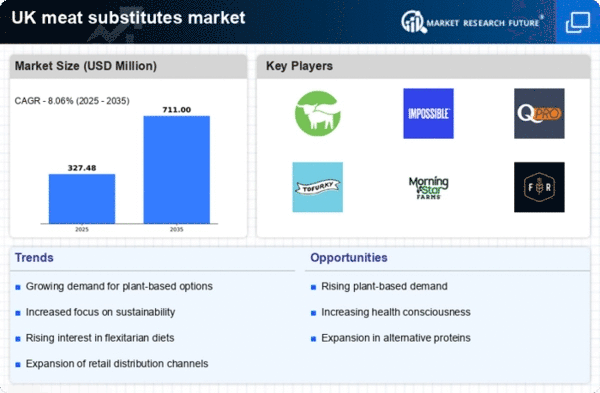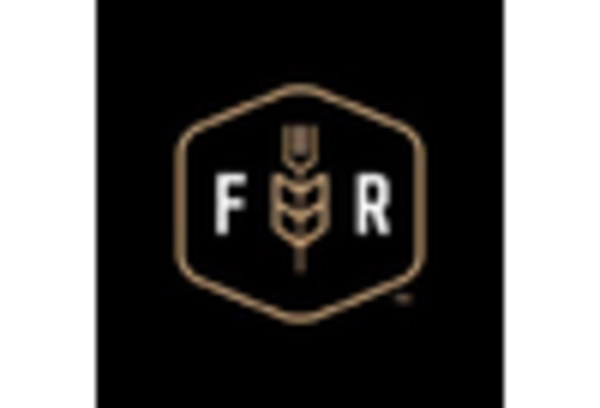Consumer Awareness and Education
Consumer awareness and education regarding the benefits of meat substitutes are crucial drivers for the market. As information about the environmental and health impacts of meat consumption becomes more accessible, consumers are increasingly motivated to explore plant-based alternatives. The meat substitutes market industry is actively engaging in educational campaigns to inform consumers about the advantages of incorporating meat substitutes into their diets. This increased awareness is fostering a more informed consumer base that is willing to experiment with and adopt meat alternatives. As educational efforts continue, it is anticipated that the market will experience sustained growth, driven by a more knowledgeable and health-conscious consumer demographic.
Rising Veganism and Vegetarianism
The increasing prevalence of veganism and vegetarianism in the UK is a notable driver for the meat substitutes market. Recent surveys indicate that approximately 7% of the UK population identifies as vegan, while around 14% are vegetarians. This shift in dietary preferences is largely influenced by ethical considerations regarding animal welfare and environmental sustainability. As more consumers adopt plant-based diets, the demand for meat substitutes continues to grow. The meat substitutes market industry is responding by expanding product lines to cater to diverse tastes and preferences, including innovative options that mimic the texture and flavor of traditional meats. This trend is likely to persist, as younger generations show a greater inclination towards plant-based diets, further propelling market growth.
Health Benefits of Plant-Based Diets
The meat substitutes market is significantly influenced by the growing awareness of health benefits associated with plant-based diets. Research suggests that diets rich in plant-based foods can reduce the risk of chronic diseases such as heart disease, diabetes, and obesity. As consumers become more health-conscious, they are increasingly seeking alternatives to traditional meat products. The meat substitutes market industry is capitalizing on this trend by offering products that are not only lower in saturated fats but also enriched with essential nutrients. For instance, many meat substitutes are fortified with vitamins and minerals, appealing to health-oriented consumers. This focus on health is expected to drive further innovation and expansion within the market, as companies strive to meet the evolving demands of health-conscious consumers.
Government Initiatives and Regulations
Government initiatives aimed at promoting healthier eating habits and reducing meat consumption are playing a crucial role in shaping the meat substitutes market. The UK government has introduced various policies to encourage sustainable food practices, including the promotion of plant-based diets. These initiatives often include public health campaigns and funding for research into alternative protein sources. The meat substitutes market industry benefits from such regulations, as they create a more favorable environment for the development and distribution of meat alternatives. Additionally, the government's commitment to reducing greenhouse gas emissions aligns with the growing consumer demand for sustainable food options, further driving the market's expansion.
Technological Advancements in Food Production
Technological advancements in food production are significantly impacting the meat substitutes market. Innovations in food technology, such as fermentation and extrusion processes, are enabling the creation of more palatable and nutritious meat alternatives. These advancements allow manufacturers to enhance the texture and flavor profiles of plant-based products, making them more appealing to a broader audience. The meat substitutes market industry is witnessing a surge in investment in research and development, aimed at improving product quality and variety. As technology continues to evolve, it is likely that the market will see an influx of new and improved meat substitutes, catering to the diverse preferences of consumers.
















